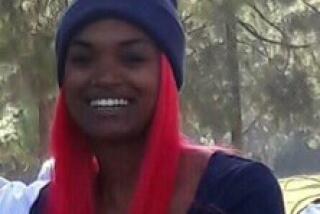Slaying of 6 Is Pinned on Father
- Share via
Saying there was no immediate evidence of financial or marital problems, investigators and relatives struggled Wednesday to understand why a Riverside County district attorney’s investigator killed his wife, mother and three children in their sleep Tuesday before he took his own life.
David J. McGowan left a note, saying, “Woe is me. I’m looking forward to seeing you in the next life.” He also included the lyrics from the hit single “Heaven” by the rock band Los Lonely Boys, which begins:
Save me from this prison
Lord, help me get away
‘Cause only you can save me now
From this misery.
Inside the sprawling, 3,200-square-foot ranch home in the rustic San Bernardino National Forest locality of Pine Meadow, investigators found evidence that McGowan murdered unsuspecting family members one by one in their beds, said Riverside County Sheriff Bob Doyle.
In addition to McGowan’s bloody footprints leading from bedroom to bedroom, his hands were covered in “blowback” -- blood and gunpowder residue from firing a handgun.
“The million-dollar question is why someone with such a reputable record would one day wake up, and the next thing you know, you’ve killed your entire family,” said Riverside County Dist. Atty. Grover Trask. “We’ve tried to rationalize why -- did he have financial, work, alcohol or drug issues? -- but we haven’t found any of that.”
Members of the McGowan family huddled at a home in Riverside on Wednesday, Sandy Curl expressing disbelief that her brother was capable of such an act.
“I just don’t know,” said Curl, whose eyes were rimmed with red as she sat on the shaded front porch of her historic downtown home. “All I know is he loved his family dearly. He was a very good father and he loved his wife. They were very close.”
Curl’s husband, Alan, described McGowan as a gentle family man.
“He saw good in everything and everybody. That’s what makes this so unbelievable,” he said. “You don’t have a favorite brother, or a favorite brother-in-law, [but] Dave in many ways was so perfect that you think this has got to be a mistake. He adored his kids. He loved his mother. It’s a mystery to us all.”
Trask described McGowan, 44, as a hard-working “model employee” whose recent evaluation left him poised to earn a promotion. Trask said his agency has found “no significant financial issues that would indicate there was a problem.”
“Something went truly awry in his psychological health,” Trask said. “You don’t just do that unless you’ve hit a depression to the point that you’ve lost all hope. What caused that, though, is something that we may truly never know.
“He was a somewhat self-effacing guy who was well-liked at work, but you don’t get beyond that [at the office], into what goes on behind closed doors.”
Doyle said at a Wednesday morning news conference that he was “very confident” McGowan was solely responsible for the deaths of his wife, Karen, 42; his mother, Angela, 75; and his three children, Chase, 13, Paige, 10, and Rayne, 8.
Doyle said investigators found that McGowan had fired seven shots from his 9-millimeter semiautomatic Smith and Wesson handgun, issued by the district attorney.
He delivered one fatal shot into the left side of the heads of his mother and the children, Doyle said.
“Karen McGowan had two shots in her head,” he said. “As this investigation moves on, that may have some significance.”
There was a trail of McGowan’s bloody sock prints in the home, indicating that he first shot his wife and mother as they slept in upstairs bedrooms, then walked downstairs to shoot his children as they slept in their rooms, Doyle said.
Emergency officials received a 911 phone call from the home at 4:33 a.m. Tuesday, believed to be made by McGowan. A tape of the call was played at the news conference Wednesday.
After the 911 dispatcher says, “911, state your emergency,” a gunshot is heard, followed by the apparent sound of a tumbling telephone striking a wall or floor.
“Sheriff’s Department, how can I help you?” the dispatcher asks. Only silence follows.
Deputies arrived at the home, in the remote horse country southeast of Idyllwild, within 30 minutes and found McGowan dead by the telephone, a recently fired handgun at his side, and the five family members shot in their undisturbed beds.
Doyle said it was the biggest mass murder in his 30 years with the department.
David McGowan was one of seven siblings, and one of three brothers who chose to work in law enforcement. While it could be stressful work, the Curls said, they knew of nothing that could have made him turn to violence.
“He could have a rough schedule,” Alan Curl said, recalling a late-night phone call about three weeks ago in which they could hear the exhaustion in McGowan’s voice. “But that was just that day. I don’t think it was chronic.”
The McGowans formerly lived near San Jacinto but moved to their home in the remote Garner Valley about five years ago for the rural lifestyle.
“Karen, in particular, wanted to be away from the city,” Alan Curl said. “As far as she was concerned, 40 minutes from civilization was too close.”
Since the McGowans moved, the Curls saw them only a couple of times a year at family get-togethers and holidays but spoke with the family frequently on the phone.
Angela McGowan, who was widowed two years ago and no longer wanted to live in the home she had shared with her husband, was staying with the McGowans for the week as the seven siblings tried to find a place for her to live.
“It was another case of Dave being the hero,” Alan Curl said.
“Dave didn’t have a cop mentality,” said Steven Sowles, fire chief in Cathedral City, where McGowan had spent 14 years in the Police Department and his wife had been a firefighter. “He was gentle, unassuming, quick with a handshake, always had a smile.... That’s why we all can’t believe it.”
Trask said McGowan returned to work in his Indio office Monday after spending a scheduled weeklong vacation that ended Sunday with his 44th birthday.
Doyle said he believed McGowan carefully planned the killings and moved swiftly.
After typing his note on the same sheet as the lyrics, “he killed the two women upstairs, then went after the kids,” Doyle said. “I don’t think he sat around and lamented his actions.... And then he called 911 to alert us. This was thought out.”
Doyle said McGowan’s socks were “soaked in blood.... As he trekked downstairs, you could tell where he had been.”
The discovery of the note, Doyle said, “was chilling. Here was a guy who was troubled, a guy who would kill his family but believes he’ll see them in the afterlife.”
James Fox, the Lipman professor of criminal justice at Northeastern University and author of “Extreme Killing: Understanding Serial and Mass Murder,” speculated that, rather than revenge or anger, the killings appeared to be about love and despair.
“Situations like these are what [is] called suicide by proxy, where the husband/father identifies so much with the family that he kills them as part of his suicide,” Fox said. “He sees them as an extension of himself. Typically, you have someone who is so depressed, he thinks life is not worth living ... and wants to keep his family together and reunite them all in afterlife. He takes their life to spare them the misery he sees on Earth.
“In fact, it’s a murder of love. That may seem like an odd way to express it, but it’s not typically done out of anger. It’s done out of this idea that the afterlife will be better.”
Four autopsies were to have been done Wednesday by the Riverside County coroner’s office, and Doyle said he expected all six to be concluded by the end of the week. Results were not immediately available.
Times staff writers Ashley Powers, Susannah Rosenblatt, Veronica Torrejon and Janet Wilson contributed to this report.
More to Read
Sign up for Essential California
The most important California stories and recommendations in your inbox every morning.
You may occasionally receive promotional content from the Los Angeles Times.















